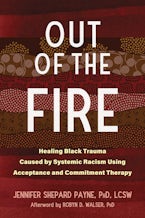By Jennifer Shepard Payne, PhD, LCSW, author of Out of the Fire
Some may be surprised to realize (and others not so much) that many epidemiology and prevalence studies show that Blacks in America have the highest rates of trauma in the United States. For instance, the US Department of Justice has published statistics that show that urban Blacks are more likely than Whites or Hispanics to be victims of violent crime. In national studies such as the Collaborative Psychiatric Epidemiology Survey, Blacks more frequently meet the criteria for post-traumatic stress disorder (PTSD) than other racial groups. In addition, homicides are more likely to occur against Blacks than against Whites in highly populated areas, according to the US Department of Justice. (US Dept. of Justice, 2007).
An additional challenge when working with the Black community is their use of mental health treatment. It is well documented that Blacks underutilize mental health treatment. Several reasons exist for Blacks underutilizing mental health treatment; I will not spend time detailing them here. However, stigma is a big problem regarding utilization, and in many cases, rightfully so.
So, evidence-based practices (EBPs) work. They have been proven through randomized controlled trials and meta-analyses to work. However, EPBs only work for those who have access to the treatment. Blacks often experience mental health disparity because they have less access to quality, evidence-based mental health services in their communities. Second, EBPs only work for those who choose to trust the process (Whaley, 2011). Arthur Whaley has researched this area and coined the term “cultural distrust” to describe many Blacks’ views about mental health treatment. Due to the Tuskegee experiments and the fact that the history of psychology in America is fraught with negativity toward Blacks, many do not trust the “system” of clinical treatment. Thus, many suffer silently and chronically with emotional problems for years. Third, EBPs only work for those motivated to participate in treatment (Corrigan, Druss, & Perlick, 2014). Because of the clinical bias and negative experiences that some Blacks have had with doctors and therapists, they may not be motivated to continue after the first session.
Acceptance and commitment therapy (ACT) can address issues that keep Blacks from treatment. As an intervention, ACT has some benefits that may appeal to the African American population. First, ACT shows potential in treating trauma in Blacks because it is a non-pathologizing approach (McLean & Follette, 2016). Other methods, such as cognitive behavioral therapy (CBT) for example, have the goal of the reduction of symptoms. For instance, the purpose of CBT is to reduce negative thoughts. Often a client needs to have a diagnosis such as depression or anxiety to begin work reducing the behaviors and thoughts associated with the diagnosis. However, ACT differs because clients don’t need a diagnosis to begin work. Instead, ACT promotes the understanding that suffering is part of the human condition (not a dysfunctional, diagnosable disorder). ACT normalizes suffering, normalizes pain, and normalizes avoidance as normal human responses, while at the same time, ACT helps individuals move toward more value-driven living. Based on prior research, the normalization and destigmatization of the human experience have been noted as appealing to the African American community.
Thus, ACT is a very promising intervention to help treat the type of suffering that Blacks and other marginalized populations go through. Further tailoring of its elements can only enhance its use with African Americans.
Jennifer Shepard Payne, PhD, LCSW, is founder and owner of DTG Counseling and Consulting, a private practice where she provides acceptance and commitment therapy (ACT) counseling and coaching primarily to African Americans of faith suffering from anxiety or trauma. She is research faculty at Kennedy Krieger Institute, and assistant professor at Johns Hopkins University.



 Part 2: What to Do When a Client Is Participating in Self-Judgment?
Part 2: What to Do When a Client Is Participating in Self-Judgment?